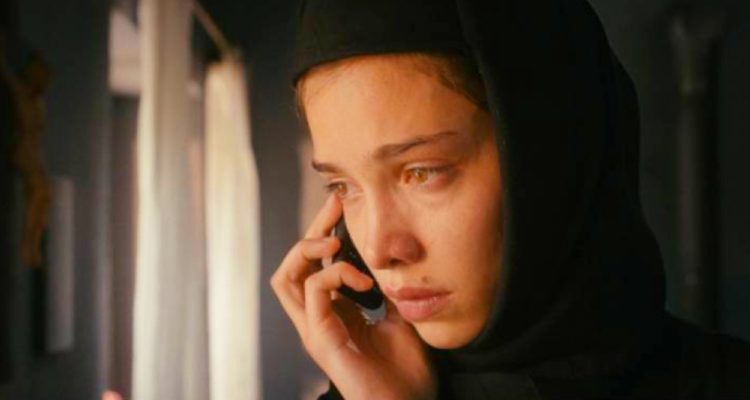A journey of discovery rooted in questions about faith, fate, and mortality, “Miracle” offers up revelations like slow drips from a faucet, building to a staggering conclusion that synthesizes all of the film’s narrative ingredients. Part two of director Bogdan George Apetri’s Romanian trilogy, the film is self-contained as a piece, yet features characters from 2020’s “Unidentified” along the edges, expanding the tapestry of this world while germinating an entirely new story. The finished product is not only an improvement on the first installment, but a riveting and nuanced exploration of not just two individuals, but of man, God, and the human condition itself.
READ MORE: Venice Film Festival 2021 Preview: 12 Must-See Films To Watch
Broken into two acts, the first deals with a young woman going through something of a trial period at a Romanian convent. Not yet a nun, Cristina (Ioana Bugarin) still dresses the part and appears sincere about eventually taking her vows when she sneaks away from her fellow sisters one day to go to a doctor’s appointment. Given a ride by Albu (Valeriu Andriuţă), the sympathetic cab driver brother of one of the other nuns, Cristina travels to town to meet with what she claims to be a neurologist, though when no one’s looking, she slips over to the OB/GYN wing.
READ MORE: Fall 2021 Movie Preview: 60+ Must-See Films
Cristina makes a couple more stops on the way (the importance of which is revealed later), then gets a ride back to the convent, where she runs into unexpected, terrible trouble along the way. The second portion of “Miracle” picks up the story a couple of days later, when police Inspector Marius (Emanuel Pârvu) is questioning nuns at the convent about Cristina’s trip to the doctor. No spoilers here, but something bad happened to the young woman, and Marius’ increasing desperation to find and punish the person responsible frames the back half of the film.
Narrative-wise, “Miracle” feels like something of a riff on “Unidentified,” as they both devote a great deal of time to a dogged police detective plowing ahead on a seemingly hopeless case. Like symphonic variations on a theme, the two movies share more than just a setting and a handful of characters; they also splash around in the same genre waters, where strung-out cops play around on the edges of the law and rap their knuckles against the stress of their hunch. This is just what’s on the surface, however, as “Miracle” uses crime and criminals as the launching pad for its story rather than the platform itself.
READ MORE: ‘Becoming Led Zeppelin’ Is A Leaden, Overlong Doc Solely For Superfans [Venice Review]
Nearly every character except Cristina makes mention of the world’s alleged decline, with several taking aim at the young woman’s piousness. To Albu, his doctor passenger, Inspector Marius, and others, the thought of a young woman throwing her life away to become a nun in a world that’s lost its humanity is an unfathomable tragedy. It’s this outlook that informs not just the second part of the picture but gives birth to the conflict that serves as the thematic undergirding of the piece as a whole. Indeed, the title suggests that there’s still room in the 21st century for something science and reason can’t quantify, and it is this struggle, not the police procedural, that is the engine of “Miracle.”
Visually, Apetri’s use of long, unbroken shots early in the picture initially seems like little more than flashy showmanship, yet quickly reveals itself to be an essential function of the camera’s communication with the audience. It’s difficult to expand much further without revealing key details of the story, but suffice it to say that Aperti’s use of the camera to communicate a deliberate point of view, crossed with its unedited presentation of time and place, play a crucial role in telling this story. This technique also allows the actors to process their thoughts and emotions in real-time, with these long stretches of focused observation revealing secrets that the story hasn’t yet revealed in sighs, shuffles, and shudders.
These moments are essential, though they can be a bit taxing at times, and test the viewer’s patience here and there. Pârvu manages to wring quite a bit out of his silent scenes, though he has the benefit of a narrative that’s paying off the first half’s breadcrumbs, which do indeed add up. In many ways, Bugarin has the more difficult role, for “Miracle” relies on her silence and reluctance to give any more information than is necessary to drive the second part of the feature towards its series of devastating reveals.
Unassuming at first glance, yet methodical in its unspooling, the film cashes in its audience’s patience with a complete picture of events when the credits finally roll. Thoughtful sound design mixed with a patient eye behind the camera elevates an already tight narrative whose beats lead the audience through a fast 118-minute runtime. Simple in scope, yet complex and precise in its execution, the result is a marvel befitting its title. [A]
Follow along with our full coverage from the 2021 Venice Film Festival here.

